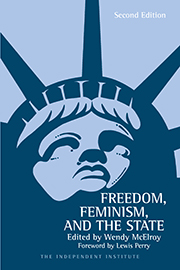Terrorism is a diffuse threat that cries out for diffuse solutions. One practical step toward combating domestic terrorism is an armed citizenry who exercise their Second Amendment right to bear arms.
Until a hijacking or explosion occurs, it can be impossible to tell who is a terrorist and what will be targeted. The paranoia spread by this uncertainty is one of the weapons wielded by terrorists. They depend upon the fact that law-enforcement cannot be everywhere and, as you go about your daily life, you will never feel safe.
People must now play a more active role in their own self-protection. It is important for ordinary, responsible citizens to be able to own and carry guns in order to protect themselves, their families, and innocent by-standers.
In Israel, about ten percent of the adult population have permits to carry concealed weapons. In an article in the Sept. 28 Wall Street Journal, Dr. John Lott, a senior research scholar at Yale University Law School, commented on how Israel’s gun policies provide a barrier against terrorism, making its citizens far more difficult to victimize. Lott estimates that to equal this per capita rate of permit holding in the United States, “Americans would have to increase the number of permits from 3.5 million to almost 21 million.”
The strategy of an armed citizenry offers many advantages. It does not preclude other options or violate civil liberties; it does not require a draft; and it costs the taxpayer nothing.
It is a fundamental part of the American character to defend the innocent even at great risk. The passenger-heroes of United Airline Flight 93, who overtook their hijackers and forced their plane down before it could hit its intended target, died to save the lives of people on the ground—people they did not know. But only 33 states allow law-abiding citizens to carry weapons. “Right-to-carry” policies would encourage ordinary people to defend themselves.
The United States has a long tradition of private citizens participating in defense during times of war. As far back as the Revolutionary War, civilians who met certain requirements (such as posting a security bond) were granted “Letters of Marque and Reprisal” by congress which allowed them to arm “a private ship of war.” During the American Revolution and the War of 1812, these “privateers” were particularly effective against the British who encouraged pirates to seize and plunder American merchant ships.
On Sept. 25, Rep. Ron Paul, R-Texas, recommended that Congress consider exercising it’s Constitutional power to grant Letters of Marque and Reprisal. “Today, we have a new type of deadly piracy, in the high sky over our country. The solution the founders came up with under these circumstances was for Congress to grant letters of Marque and Reprisal,” Paul said. Again, this strategy has advantages. It does not preclude other options; it doesn’t necessarily involve civil liberties or reshape geopolitics; it narrowly targets terrorists at no taxpayer expense.
Paul is not the only one advocating this strategy. In his essay “Let Privateers Troll for bin Laden,” Larry Sechrest—a research fellow with the Independent Institute—argues for a return to privateering. He quotes Thomas Jefferson as saying, “Every possible encouragement should be given to privateering (against an enemy) in time of war.”
What would such a private venture look like today? Perhaps it would resemble the $5 million dollar bounty—raised solely through private funding--the FBI has posted on Usama bin Laden. Another sample of present day privateering is the $1 billion dollar bounty currently being raised by a group of high-tech executives for the leaders of Al-Qaida.
I believe in using force in self-defense. But even people who do not wish to own a gun or participate in bounty hunting—or whose religious beliefs prevent them from doing so—can still take practical steps themselves against terrorism.
The infrastructure of society is one of the main targets of terrorists: transportation and water systems, electricity and phone grids. Destroying the World Trade Center was not merely an act of murder and anti-American symbolism: it was meant to disrupt the financial status quo. This means that preserving the status quo of daily life and commerce is an act of anti-terrorism.
People should follow the same advice offered for Y2K and its projected break down of services. They should stock up on a few weeks of food, water, gasoline, and other essentials of life.
This is not hoarding. It is self-reliance. And it means spending the money that some experts believe will cause the economy to turn around and prosper.
They can also become involved in strengthening the infrastructure of their communities. My husband and I are members of the volunteer Amateur Radio Emergency Service (ARES). During emergencies—caused by acts of God or man—communication that depends on phones or electricity is vulnerable. Through ARES, we have worked in our county to establish a ham radio network and to equip stations at key agencies such as the Red Cross and the fire department.
Only a few “solutions” to terrorism can fit within the extraordinary confines of one brief weekly column. I ask readers to write in and offer their own constructive suggestions.









